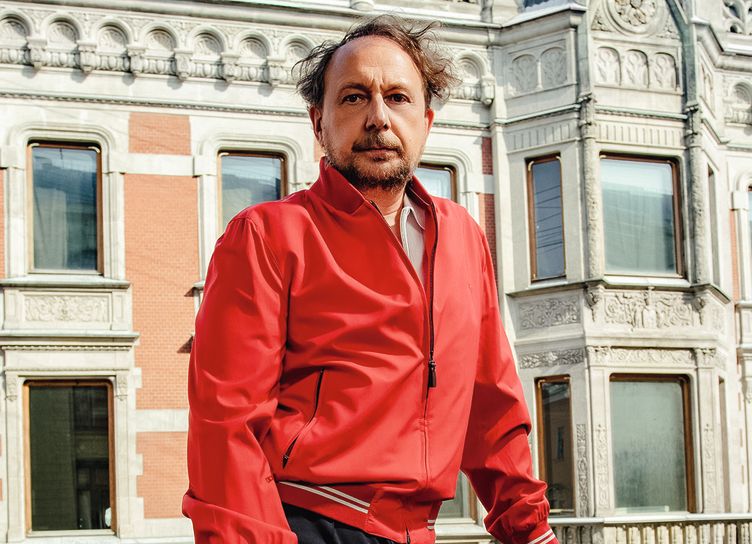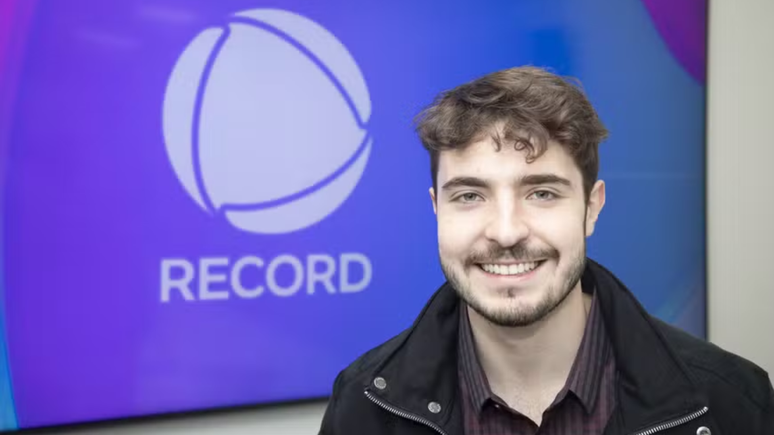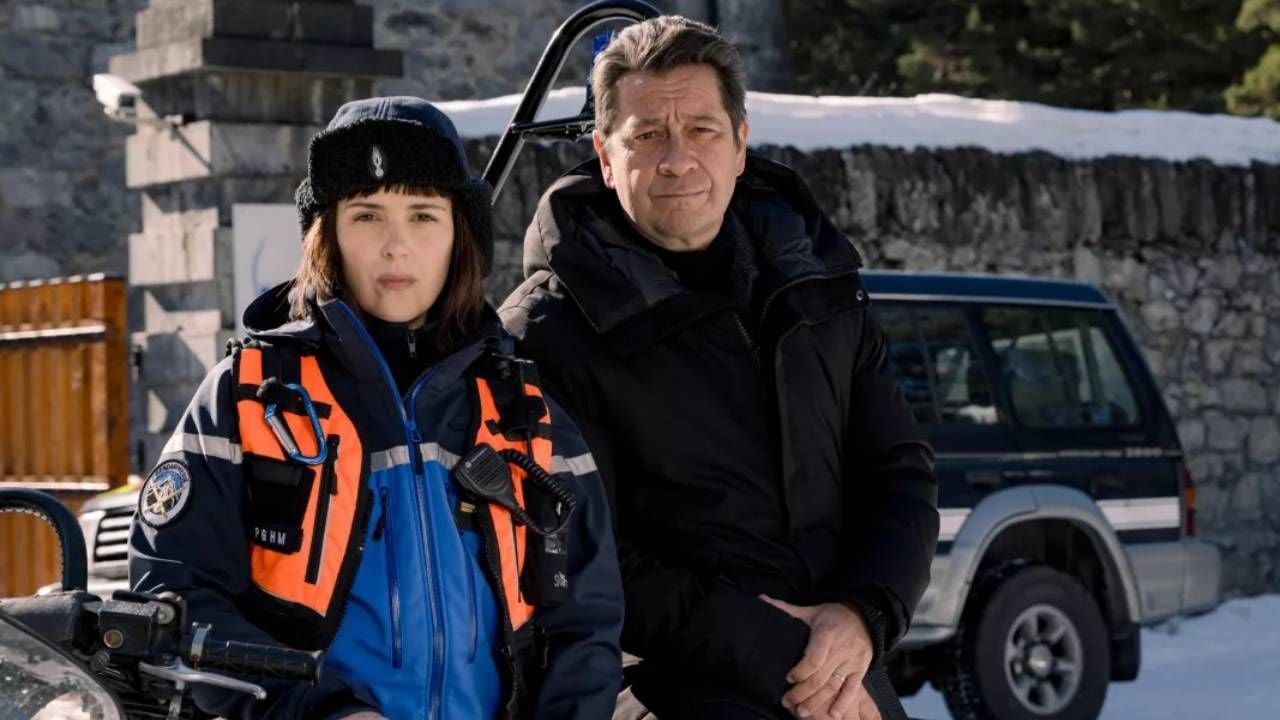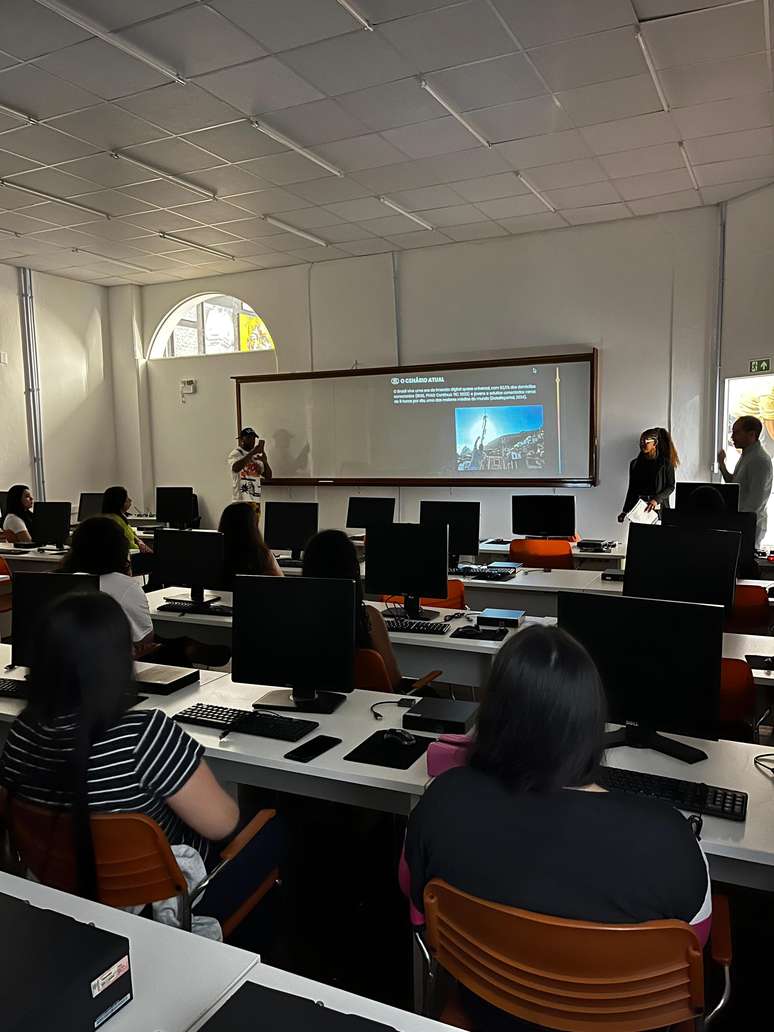______________________________
In the cozy cafe “Leningrad Center” we sit at tables connected together. Rehearsal in an hour. Artistic director Felix Mikhailov and six of his key artists – like the heroes of Luigi Pirandello’s play “Six Characters in Search of an Author” – talk about life in art and the internal kitchen of the theater. Most of them have been working here for a long time, sort of “old men”, as they call themselves, influencing the final result. Everything they do is sharp, bold, bright and professional. One for all and all for one, united for the ultimate goal – a performance that at least once you need to see with your own eyes.
Today, the Leningrad Center is a large laboratory where its own genre rules the show, which has gone beyond cabaret and variety shows and has not come to either a musical or a circus in its purest form. As its creator says: “We are thrown in one direction or the other in the desire to entertain the viewer and find the language in which we tell the stories we invented.”
Felix Valerievich, tell us about your troupe.
The main backbone is a troupe of about 50 people. Another 40 are always with us: musicians, acrobats, circus performers. In each production, we try to change the genre and look for people who could bring something of their own, unique. Having come to us for the first time, people “stick” and begin to sing, dance, try something new.
It turns out that for an artist who came to the “Leningrad Center”, unlimited possibilities open up?
This is true. We manage to follow the principle that there is no need to hit the ceiling, break through it, simply because this bar does not exist. For example, I decided to take an artist who seems to know nothing yet, but there is a chance to reveal something in him. Then you look and endure, correct – and most often it shoots. This may take a year or two, but the person thus enters the group, which is the basis of the center. Of course, all people are different, there are conflicts, but we have no set-ups in terms of work, thanks to mutual trust. That is why artists have no ceiling. Everyone knows: if something happened, you need to say it, not to hush it up.
To educate an artist is hard work, which requires a lot of patience …
I have a lot of it. The guys came on an equal footing, they are all dancers, but someone starts to put on numbers. This is a huge work both for the person himself and for those with whom he works. I try to teach them and ask them to be patient with those with whom they begin to work, because the grinding stage must go through, trust will appear. If I entrusted someone to lead people, I always follow who does it how, listen to intonations and begin to understand whether a person will pass this test or begin to assert himself at the expense of others. Since we do not have theatrical squabbles, then everyone who is trusted with mini-power, at some point cope with this. There can be no good result if people have not yelled at each other at least once. A director who embodies his ideas through other people will sooner or later be faced with the fact that he will utter a word that someone is sure to misunderstand. A lot of time is spent trying to develop a unified coordinate system. This also requires patience.

How did Leningrad Center survive the pandemic?
We did not work for a month and a half, then we were given the opportunity to organize a creative camp. As a result, we came up with a drive show and worked on the road, creating the format of a car theater. In the summer we just went to the circuit, set up an open-air stage. Spectators came there in cars, we played a performance not only on the stage, but also around the cars. It turned out that on the one hand, safety rules were fully observed, on the other hand, the artists did not lose their shape. However, the morning run could differ from the evening run in terms of composition – by 17:00 PCR tests arrived and, if it turned out that the artist was sick, they had to urgently come up with a replacement, combine numbers …
The task of each artist is to find his director. Have your artists found you?
Rather, they found those four walls in which conditions were created for them, where they are comfortable in everyday and moral terms and there is an opportunity for creative realization. I tried to make sure they didn’t come here to work. At one time I did not go to work in any theater after graduation, because I understood that I would go to work. Here you are sitting and waiting for the list of roles, you are the butler again, and you turned fifty and Hamlet can no longer be played.
Creating the “Leningrad Center”, I understood that it was necessary to look for individualities, there should be stars nearby, but not as competitors, but in order to improve and complement each other. At one time, the play “Portfolio” was born, where the guys themselves tell the viewer about themselves. For the role of myself, that is, the director, I invited Dasha Moroz, she conducted the casting, and the viewer heard not a script text, but a set of very personal numbers – statements.
Victoria Chapaykina

It is very important for me that the people around inspire me, so that I would like to create side by side with them. I used to dream of a regular working day, but I’m afraid now I won’t be able to live in such a schedule, since the ideal working environment for me is Leningrad Center.
There are so many talented people here! You look at what they do and you think: “Wow! I want the same.” And you ask for a rehearsal to try. Then you either get hooked or you don’t. But even the process gives a lot, allowing you to develop as a person and as a professional.
Now I am a completely different person than I was before, I have become kinder and more patient. When I put numbers, I treat all participants in the process with great respect. Some argue, sometimes we swear, but this makes it possible to come to an excellent result.

Keiko Lee

My ideal work environment is togetherness. It is very important to look in the same direction with those with whom you create, create and live. Valuable respect for each other and absolute fanaticism to their work. There is no mechanical work here, I dance, put on numbers, I have the opportunity to share my feelings with the audience.
Impatience arises when you don’t like something. And I like everything here, I’m patient. I’m not a teacher, at first I didn’t understand why, when I put a number, it doesn’t work right away. Colleagues told me: wait, it takes time, you need to communicate with people. And when you accept it, everything suddenly starts working. The main thing is to create a climate that is comfortable for everyone. We have learned to negotiate among ourselves and we have a dialogue with the director. We matured, got used to and accepted each other.

Valeria Turova

For me, the ideal environment is creativity and kindness. It is important that in any, even the most emotional situation, a person remains a person. And of course, you need each other’s support in any endeavors in order to shine yourself and so that your neighbor shines on an equal footing.
I had a sports childhood, it helps me achieve my goals more persistently and calmly. In the theater, everything is different, less systemic, but more creative. The approach to work in a creative environment is more emotional. When you are only a performer, it is better to listen and do as they say, but when Felix suggested that I put on the numbers myself, I began to learn how to communicate with people. From the emotional “why can’t you hear me” to understanding that you need to work on yourself first.

Roman Osipov

Being an artist of a theater in which there are no creative restrictions is priceless. It is this experience that “Leningrad Center” gives me. I am new here and so far I am acting as an obedient performer.
I studied to be a choreographer in Kemerovo, where I studied staging and came up with the main idea: you need to listen to what you are told and do it. Practice shows that this is the fastest and most effective way to achieve the desired result.

Oleg Khmelev

There is only one place in Russia where real miracles happen – this is the Leningrad Center. And only the troupe, the theater workers and the director know how hard these miracles are created.
Sometimes, when you prepare for a show for a long time as an artist and as a choreographer, having played the premiere, you feel a certain emptiness, it is such an emotional process to which you give everything. But in the end, you look and think: I work in the best theater in the world!
It can be difficult to combine the position of an artist, choreographer, at the same time doing rehearsal work, especially if it all falls down at the same time … Every time I talk to myself, I set myself an example of Felix, who remains calm and manages to do a lot of diverse things.

Vladislav Rudenko

For an ideal working atmosphere, it is important that people who are in the same process with me are energetically close to each other, in other words, on the same wavelength. This is what provides not only a pleasant process, but also an amazing result.
I realized that for creative people, artists and directors, the work path is the most important. We spend so much time on rehearsals, preparations, and at the end we get a number for 2-3 minutes, maybe 5. Accordingly, this whole journey should be very comfortable. Experience has taught me how to communicate with people. We are all different, each needs an individual approach. When blockages occur, everything around is unstable and constantly changing, and you need to go out to the audience, you exhale, accept the conditions of the game and work, because you are an artist and a professional.

Source: Hellomagazine
Jason Root is a writer at Gossipify, known for his in-depth coverage of famous people in entertainment, sports, and politics. He has a passion for uncovering the stories behind the headlines and bringing readers an inside look at the lives of the famous. He has been writing for Gossipify for several years and has a degree in Journalism from UC Berkeley.









